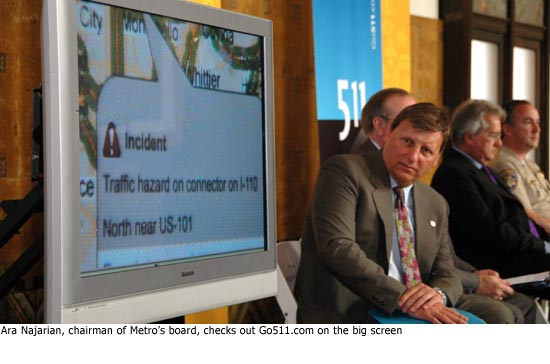Dial 511 to get around town
June 17, 2010
A new phone and internet service to help travelers navigate the confusing and congested maze known as Southern California made its debut this week.
Unlike sites such as Sigalert.com and Traffic.com, or good old drive time radio traffic dispatches, the new Go511.com and 511 toll-free phone service offers freeway traffic reports augmented with information about ride-sharing, carpooling, bicycling and taking the bus or train.
It’s now in beta testing mode, which means that Ken Coleman, the Metropolitan Transportation Authority’s motorist services program manager, wants to hear from you on what works—and what doesn’t—in the new service. The system offers prompts for feedback both on the phone and on the website.
Since billboards and other publicity for the service started rolling out, 511 usage is growing, topping 20,000 calls on Tuesday. Between 400 and 500 users have offered comments, two-thirds of them positive, Coleman said. Those who didn’t like it were frustrated by things like having the system’s voice recognition technology offer them travel times between two freeways rather than specifics on congestion at one point along the freeway.
The initiative is being funded for a 10-year period with $30.8 million from the Los Angeles County Service Authority for Freeway Emergencies (LA SAFE.) Most of the funds had previously been directed toward supporting a network of freeway callboxes, which are being used far less frequently these days because of the proliferation of mobile phones. (Coleman said L.A. County, which once had 4,500 callboxes, now has 1,700. In the early ‘90s, he said, 90,000 calls a month were made from the boxes. Now that number is closer to 2,500 calls a month.)
Metro’s partners in the 511 system include Caltrans, the CHP and transportation agencies in Orange and Ventura counties.
The 511 automated phone system—to be used hands-free while driving, of course—covers Los Angeles, Orange and Ventura counties, while the website offers information on San Bernardino and Riverside counties as well. Upcoming improvements include voice recognition for Spanish language prompts and smart phone applications, including a configuration of the website that works on a mobile phone.
Ultimately, Coleman envisions tapping into more sources of data to offer a comprehensive, traveler-focused service that would assist not just the region’s commuters but also tourists arriving for a visit.
Southern California, he said, “can be a very daunting place to navigate if you have no idea.” As those who live here know only too well.
Posted 6/16/10













 405 bridge work causes a stink
405 bridge work causes a stink

